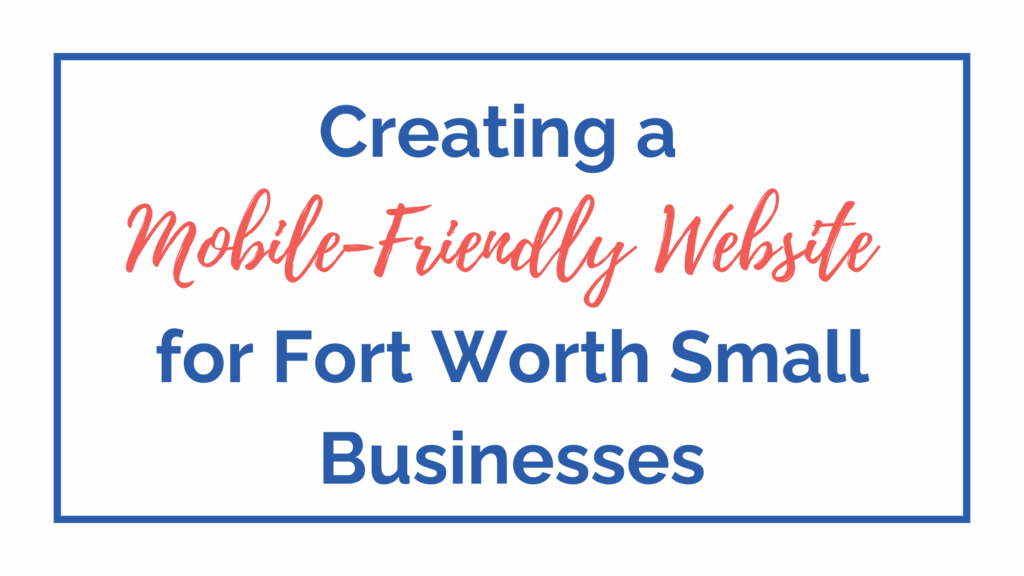Mobile-Friendly Website Fort Worth: Why It Matters & How to Do It Right
If you’re a small business owner in Fort Worth, you’ve probably noticed more people browsing on their phones than on desktops. That means having a Fort Worth mobile-friendly website is not optional anymore. A responsive web design ensures your site works smoothly on any device, giving visitors a strong first impression and keeping them engaged.

In this article, we’ll go through why a mobile-friendly site matters, how to build one even on a tight budget, and what to watch out for. We’ll cover everything from design principles to development tips and optimization strategies. By the end, you’ll know how to create a website that looks great on mobile and helps grow your Fort Worth business.
Why a Fort Worth Mobile-Friendly Website Design Is Essential for Fort Worth Small Businesses
Mobile-First Reality and Local Impact
- More than half of web traffic comes from smartphones, making a Fort Worth mobile-friendly website critical for capturing local searches.
- When people in Fort Worth search for local services like “coffee shop near me” or “Fort Worth plumber,” they are often on mobile. A site that works well on phones helps you capture those potential customers.
- Google prioritizes mobile-friendly sites in its ranking, which means your Fort Worth mobile-friendly website can improve your SEO performance.
See actual Fort Worth website design case studies where responsive design improved lead generation.
Better User Experience and More Conversions
- A responsive design adapts to different screen sizes, so users do not have to pinch or scroll awkwardly.
- Navigation that works on mobile keeps users on your site longer.
- Faster mobile load times increase engagement and reduce bounce.
Learn about the core elements of a high-converting website for Fort Worth businesses in our blog.
Cost Efficiency and Long-Term Value
- Instead of maintaining separate mobile and desktop sites, you build and manage one responsive site.
- Updates are easier and less expensive with a single site.
- A responsive site is ready for new devices like foldable phones.
How to Build a Truly Mobile-Friendly Website for Your Fort Worth Business
Step 1: Start with Responsive Web Design Principles
- Use fluid grids and flexible images so your layout adjusts naturally to different screen sizes.
- Make sure your content is structured for mobile with readable text sizes, clear buttons, and prioritized calls to action.
- Consider adaptive web design only if you need very different layouts for mobile and desktop.
Ask your Fort Worth customers how they use their phones when looking for your services. Do they mainly want your phone number, or are they exploring your offerings? This helps guide what to prioritize on mobile.
Step 2: Prioritize Speed and Performance
- Use Google’s PageSpeed Insights to test and improve speed.
- Compress images, minimize JavaScript, and remove unused CSS so mobile pages load fast.
- Faster load times keep users happy and help with SEO.
Step 3: Design for Mobile Usability
- Make touch-friendly buttons that are easy to tap.
- Keep navigation simple and intuitive.
Step 4: Test, Launch and Iterate
- Use Google’s Mobile-Friendly Test to check your site.
- Run usability testing with real Fort Worth users. Ask questions like “Can you find my hours? Can you call me from the site?”
- Use Google Analytics to monitor mobile user behavior and refine your layout and content as needed.
After launch, run a Fort Worth-specific A/B test for mobile landing pages. For example, highlight “Open on Main Street, Fort Worth” versus generic business info. Local details can make a big difference.
Key Technical Considerations and Best Practices
Responsive Web Development versus Separate Mobile Site
- With responsive development, you maintain a single site. This simplifies SEO and updates.
- Separate mobile sites create maintenance burdens and SEO challenges.
SEO and Mobile Optimization
- Use the same URLs for mobile and desktop for consistency.
- Use meta viewport settings so your mobile layout scales correctly.
- Check mobile usability regularly in Google Search Console.
Touch, Accessibility and UX
- Buttons and links should be large enough to tap comfortably.
- Maintain good contrast, readable fonts, and layouts for accessibility.
- Keep branding consistent across devices so your site feels cohesive.
For Fort Worth-based clients, include a “Call from this Page” button at the bottom of mobile layouts. Many users will call directly, so make that action simple.
Measuring and Optimizing Your Mobile Experience
Track Key Metrics
- Monitor mobile bounce rate, average session duration, and conversion rate.
- Segment data in Google Analytics to compare mobile and desktop behavior.
- Review page speed reports and identify slow-loading pages.
Gather User Feedback
- Ask customers if the mobile site worked well for them.
- Add a feedback widget: “Was this mobile experience helpful?”
- Conduct usability tests or surveys with Fort Worth customers.
Improve and Iterate
- Refine layout, content, or calls to action based on feedback.
- Make mobile-specific improvements like emphasizing “Contact Us.”
- Test speed and usability after changes to maintain strong performance.
Conduct a quarterly mobile audit to review analytics, collect feedback, and test your site. This keeps your site optimized for Fort Worth users.
Common Mobile Design Mistakes and How to Avoid Them
- Ignoring Page Speed: Compress images and use caching.
- Tiny Buttons or Hard-to-Tap Links: Make touch targets easy to press.
- Cluttered Layouts: Keep it simple for small screens.
- Not Testing on Real Devices: Emulators are helpful, but real phones show real issues.
- Overlooking Mobile Conversions: Track calls, map clicks, and form submissions from phones.
Many Fort Worth business owners overlook map clicks as a conversion. On mobile, a click to open your address in Maps can be just as valuable as submitting a form. Avoid the top mistakes that many Fort Worth Website Designers make, especially on mobile.
We’ve written about common Fort Worth Businesses Get Wrong About Website Design and how to fix them.
Why Working With a Local Web Developer in Fort Worth Helps

- A web developer Fort Worth-based understands local customer habits and search patterns.
- Local developers can test on real devices and carriers to ensure your Fort Worth mobile-friendly website works flawlessly for actual users.
- You get hands-on support for updates, feedback, and quick fixes.
- A responsive design tailored to your local audience builds trust and helps your Fort Worth mobile-friendly website turn more visitors into customers.
Quick Takeaways
- A mobile-friendly website is essential.
- Responsive web design ensures your site works on all devices.
- Prioritize page speed, touch-friendly navigation, and usability.
- Track mobile behavior and iterate using real user feedback.
- Avoid common pitfalls like tiny buttons or cluttered layouts.
- Working with a local Fort Worth web developer offers tailored design and ongoing support.
💬 What our clients say:
I had an amazing experience with this team. They did an awesome Job. I would recommend anyone who needs a website design. Go MB Marketing LLC! – Murama Rugumanya ⭐️⭐️⭐️⭐️⭐️
Conclusion
If you run a small business in Fort Worth, creating a Fort Worth mobile-friendly website is one of the smartest investments. It improves SEO, attracts more local customers, and builds credibility. Your website becomes a reliable hub people can access from their phones, whether they want your hours, want to call you, or check your services.
Focusing on responsive web development, speed, usability, and mobile testing helps your business succeed. You do not need a huge budget to start. With thoughtful design and smart testing, your site can perform on mobile as well as desktop.

Ready to make a Fort Worth mobile-friendly website or improve your current website? Reach out to Panther City Digital Marketing to create a responsive, high-performing website tailored for Fort Worth.
FAQs
Q1: What is responsive web design and why is it better than a separate mobile site?
A: Responsive web design adapts to all screen sizes. It is better than a separate mobile site because it is easier to maintain, helps SEO, and avoids duplicate content.
Q2: How do I know if my website is mobile-friendly?
A: Use Google’s Mobile-Friendly Test and PageSpeed Insights to catch usability or speed issues.
Q3: Does having a mobile-friendly website improve Google rankings?
A: Yes. Google uses mobile-first indexing, so a responsive, mobile-optimized site can improve SEO.
Q4: How can I make my mobile site load faster?
A: Optimize images, reduce unnecessary code, and use caching. Test speed frequently with PageSpeed Insights.
Q5: How much does it cost to build a mobile-friendly website?
A: Costs vary, but having one responsive website is often less expensive than managing separate desktop and mobile sites. Maintenance is simpler.



